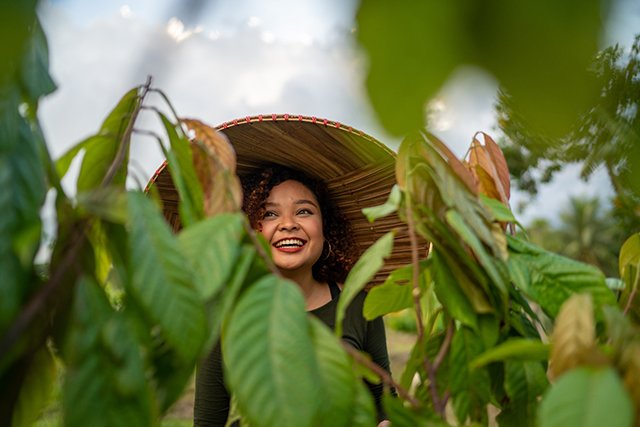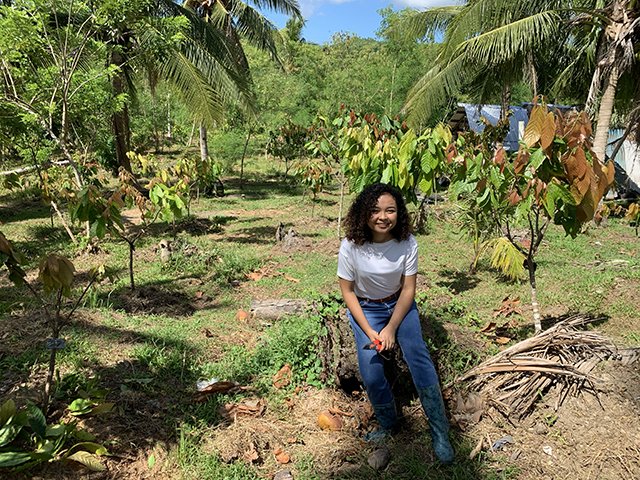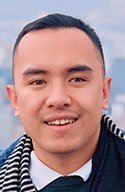She’s a Farmer and She’s Okay

Louise Mabulo (Photo courtesy of Louise Mabulo)
“Moving here made me see another face of poverty,” Louise shared. “In the UK, I had free education, free school bags, and uniforms, and children here were going to school barefoot with a plastic bag to carry their things.”
It started Louise’s will to champion the less fortunate and to empower farmers. “In the UK, farming was a dignified trade. Farmers owned land, tractors, and they did well financially. I was surprised that farmers here are considered impoverished.”
“When you hear the word ‘farmer,’” Louise adds, “you imagine an older man in the provinces, of a certain social status and lower income level, but there are a lot of women leaders in agriculture, too. A lot of farmers are women, and it’s just that we’re not given as much representation or recognition because we have deeply rooted cultural stigmas.” This is the construct that she aims to change.
For Louise, it is about reframing. In Philippine schools, when a student is failing, we say, “‘Kung hindi ka mag-aaral nang mabuti, mangangamote ka’ (If you don’t study well, you’ll end up working in the fields).” The students who come from these farming families then lose self-esteem and think that they are in a worst-case scenario.
Farmers’ children may think, “I come from a farming family, this is a bad thing for me” and that cycle feeds itself. Farmers are not traditionally thought of as entrepreneurs, the backbone of our economy, the reason why we eat three meals a day.
“Instead of just considering a desk job, what about making a livelihood out of agriculture, tilling your land, having better living conditions in the province where there is no pollution, and eating fresh food. That’s what I wanted them to exhibit: Pride in what they do, and to break our discriminatory idea of farming.”
At a tender age, Louise bought a four-hectare farm with her own earnings as a young chef. Fans may remember the 11-year-old Louise as a Masterchef Philippines Top 5 finalist in 2011. She has since won awards for her culinary talents.
Louise’s community work started with Typhoon Nock-ten in December 2016, which destroyed almost 80 percent of crops in her hometown. She realized that food systems may be more meaningful beyond just making dinners and desserts. She had to have her hands on the earth.

Louise Mabulo on her farm (Photo courtesy of Louise Mabulo)
She started the Cacao Project, first as a typhoon relief effort, then as a larger community initiative. An 18-year-old Louise used this social venture to equip the farmers in San Fernando with disaster techniques, regenerative agriculture, and climate adaptability to help them transition to sustainable farming systems. Observing that most farmers in her hometown are women, Louise also later started the Women Farmers Initiative. For the Cacao Project, Louise became a recipient of the Young Champions of the Earth Prize from The United Nations Environment Programme (UNEP).
Like every leader, Louise has had her fair share of detractors. Her critics includes a well-known vlogger Louise welcomed to her plantation only to call her project a for-profit that exploits farmers, and calling her an haciendera (plantation owner).
Louise was told, “You are not a farmer, because you don’t look like one.” Smiling, Louise asks, “And what is a farmer supposed to look like anyway? I only have four hectares, and the farmers are actually farmers, not beneficiaries.”
While on lockdown due to the pandemic, San Fernando was also hit by devastating typhoons in 2020. “When Rolly came, we thought we had the worst,” Louise recalls. “We were surprised when Ulysess came.”
Although it lashed out mainly in Luzon, Typhoon Ulysses, known internationally as Vamco, dumped heavy rainfall in Catanduanes and Camarines Sur, causing flash floods and landslides. Louise started fundraising using the Cacao Project.
Her initiative brought in 400 segments of tarps for makeshift shelters. Louise and her team bought dried fish from local fisherfolks to support the local economy. These were given as part of the relief packs. Since the local crops were washed away. Louise prepared packs of canned goods, rice, and pancit (noodles). To help the farmers recover their livelihood, the project also handed out seeds, pruning shears, and shovels. During the few days after the typhoon when power was out, the Mabulo family opened its doors as a charging station.
Their efforts aside, Louise still credits the bayanihan (cooperative) spirit.
At a tender age, Louise bought a four-hectare farm with her own earnings as a young chef.
“We were all equal after the bagyo (typhoon),” Louise says. “All of us lost something. But despite the impacts and traumas, we need to understand that this may be an annual occurrence as an adverse effect of the climate crises.” As volunteers and beneficiaries flock to her home, Louise still included what she believes is an essential part of her advocacy: education and practice.
Louise also formed the Farmer Field School for cacao training. The program teaches kids how to plan and layout their farm, grow and plant seedlings, approach year-long agriculture, cultural management including organic interventions, and disaster risk mitigation. It is, as Louise describes, from seed to bar.
“There’s no limit to what we were able to make,” Louise says with joy. “We do not just make chocolates. We have vinegars, fabrics from fossilized cacao leaves, tablea (cocoa balls for hot chocolate), cocoa lime.” Just recently, international buyers are getting in touch with Louise to ask her to supply them with their cacao needs.
“I remember after every time there is a disaster, I would look out the window and all the coconut trees are down, but my grandmother’s cacao trees are still standing,” Louise says. “The cacao is a great reminder of resilience.”

Ian Layugan hails from Baguio City and is currently based in Gunma Prefecture, Japan where he works with the Kiryu City Board of Education under the Japan Exchange and Teaching Programme. He has written for Rappler and has led research projects for Oxfam, Asmae International, and the Asia Research Institute at the National University of Singapore. Follow him on Instagram/Twitter at @ijlayugan.
More articles from Ian Layugan




No comments:
Post a Comment